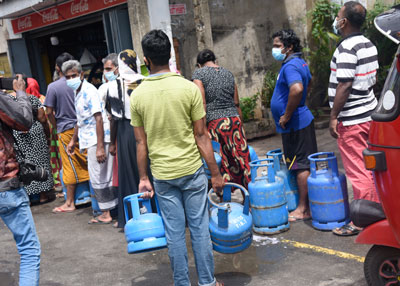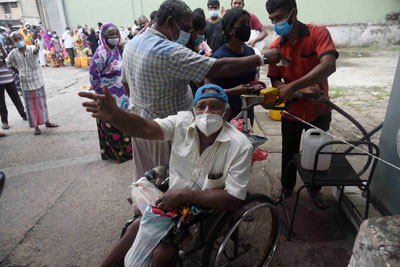News
Cooking gas shortage fuels public anger on the streets
Dozens of desperate Sri Lankans unable to buy domestic gas canisters have been lining up at petrol stations in some cities for kerosene while venting their fury at the government.
But as the days wore on and stocks dwindled, filling stations imposed limits on kerosene buyers.
Some in Colombo who joined long lines while carrying cans and bottles in the scorching heat are angry there is no cooking gas.
Even on Deepavali, which marked the festival of lights, there were no supplies of cooking gas at distributors.
Retiree P Rathnam, 65, who had once worked in a hardware shop, said he could not celebrate Deepavali because he had to wait nearly eight hours in a queue to buy kerosene from a filling station in Grandpass.

Waiting for gas like waiting for Godot. Pic by Akila Jayawardana
“The shortage of cooking gas has even forced me to spend time on the road until I could buy five litres of kerosene. I am at an elderly age, my back and legs ache, but we at least need fuel to cook our meals when there is no cooking gas,’’ he said.
An area resident, Shanmuga Yogaraja told the Sunday times that he too, had been waiting in line from morning to 2:00pm to buy kerosene.
He had no choice but to buy kerosene as he was unable to buy a gas cylinder even though he had spent hours in line for two days.
“We elected politicians seeking prosperity, but now we are spending time in long queues. The price of a 12.5 kilogram cylinder which was Rs 1,750 is now Rs 2,750.’’
Housewives are bearing the brunt of the cooking fuel shortage.
Housewife Peters Stella, 55, a resident of Punchi Borella, had walked four kilometres to buy kerosene for her seven family members.
“People in our area scold us when we use firewood for cooking. They say the smoke is disturbing them. When we use kerosene for cooking they say that our houses smell of liquid fuel,” she said.
Ms Stella said she needs to feed her family as well as relatives living next door.
Meanwhile, regular kerosene users, too, say there is no stock at most filling stations.
Wheelchair user Ranjith Fernando, 65, said that he had come from the Baseline Road in search of kerosene, as filling stations elsewhere had run out of stock.
“We normally use kerosene to cook meals, but now that too is not easy to find. Despite difficulties and the risk of Covid-19, I came, so I can give this kerosene can strapped to the back of my wheelchair to my family,” he said.
There were still others suffering silently unable to get cooking gas, or kerosene.
“We have been ordering food from outlets for the past four days as we do not have gas to cook. We cannot afford to do that continuously as it is expensive, but I have no alternative,’’ Malintha Fernando, from Wattala, a private sector employee, said.
He said he starts his day by calling all the gas distributors in the area who say they are “expecting” supplies, but that stocks had not arrived until Friday.
Meanwhile, a Bombay mootai (cotton candy sweet) manufacturer, M.D.H Fawmey, had hired a three-wheeler in which he had loaded three empty 12.5 gas cylinders of two varieties and one 5kg gas cylinder.
“I travelled to Wellawatta, Wellampitiya, and Bloemendhal Road in search of gas and was unable to find gas, now I am planning to buy kerosene, as I am unable to carry out my business,’’ he said.

Angry consumers line up for kerosene
If he can’t produce cotton candy, his family of six and 50 families which depend on selling his candy, would be unable to make a living.
Mr Fawmey said he is desperate.
A senior official of the Consumer Affairs Authority who claimed anonymity, said that price controls had to be removed as there is an acute shortage of goods due to a lack of US dollars for imports.
When the CAA imposes price controls, essential goods importers as well as other importers are unable to sell even the available stocks, he said.
Price controls on items such as chickpeas, sprats, dried fish, and green gram were imposed in 2016 and 2017. Controls were revoked as those items could no longer be sold at regulated prices, he said.
However, the Sunday Times learned that the price controls for chicken, and sugar, bombay onions and maize were imposed last year, and in September this year.
M.H Fazoon who had been lining up for kerosene for three hours, said that the government has distanced themselves from the people who brought them to power and allowed businesses to prosper.
“If the government authorities that are responsible for consumer rights are active, we do not need to be in queues during a pandemic to buy essential commodities,’’ he said.
| Consumer watchdog says dollar dearth a factor The Chairman of the Consumer Affairs Authority, Major General (retired) Shantha Dissanayake explained that the shortage of essential items such as cooking gas, sugar, and milk powder was the result of several issues, including the shortage of foreign currency, depreciation of the rupee and rising freight charges. Importers are buying foreign currency (US dollars) at underground market prices, and as a result, are unable to sell goods at regulated prices. “To keep the importers importing essential goods and avoid them [from] stashing the imports to create artificial shortages, we removed price controls. If importers make unjust profits, we will re-implement controls,’’ he said. He said that he understands that prices of essentials are high and aware that people are angry, and yet without foreign currency, the government is unable to control prices. They are at least making goods available even at high prices. Mr Dissanayake said that they are waiting until the country receives US dollars via exports and tourism to reimplement price controls on essential commodities.
| |
| Litro boss explains reasons for shortage; assures solution within a weekLitro Gas Chairman Theshara Jayasinghe has attributed the current gas shortage to an industry mafia, external market situations and the economic conditions.He said one of the reasons was his company was not in a position to supply gas to the customers from October 28 to November 1 due to threats from the supplier, even though ships carrying LP gas had reached the Colombo Port. He said the supplying company had demanded a two-year extension of Litro’s contract with it, if there was to be an uninterrupted supply of gas. He said he believed that the gas shortage was purposely and artificially created by some individuals who used the mafia for the sole benefit of them. Mr Jayasinghe said the situation was being gradually brought under control and steps were being taken to ensure the adequate availability of LPG in the market within a week. |

